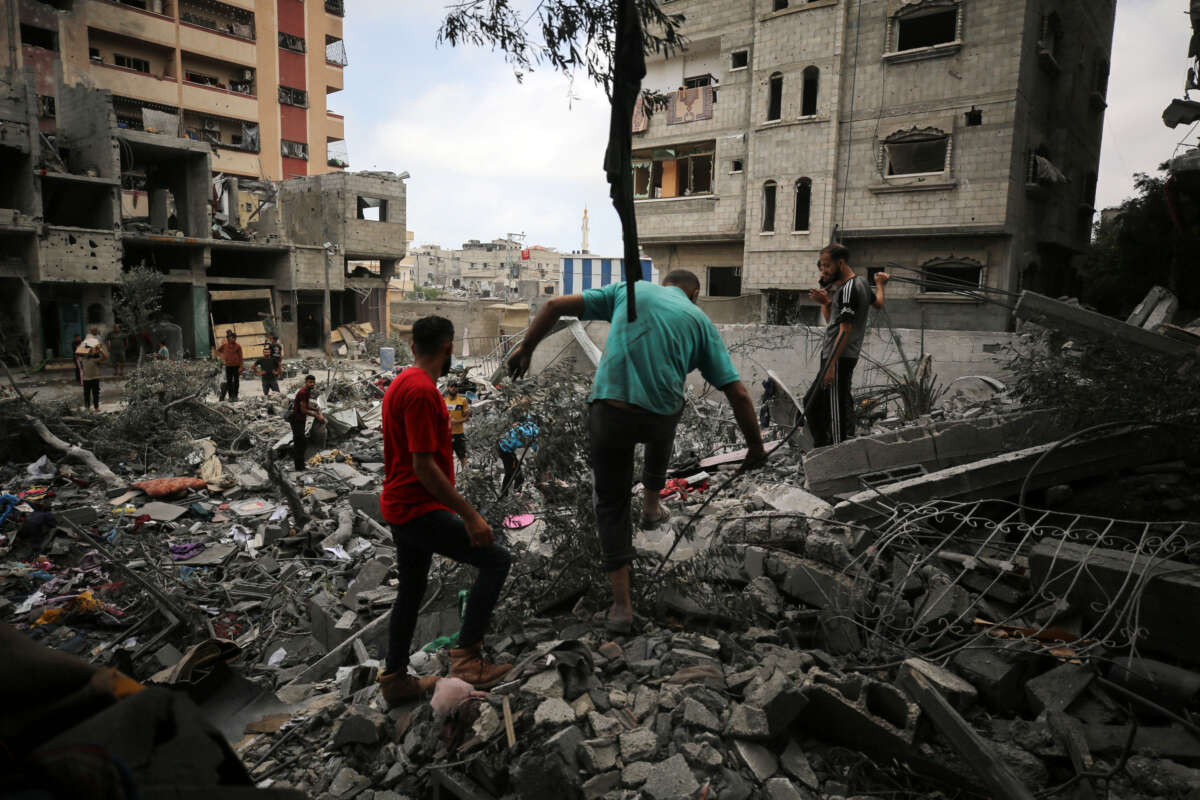Did you know that Truthout is a nonprofit and independently funded by readers like you? If you value what we do, please support our work with a donation.
Citing the “principles of distinction, proportionality, and precaution” that international humanitarian law demands military forces obey, the United Nations’ top human rights office on Tuesday said the raid conducted at Nuseirat refugee camp in Gaza by the Israel Defense Forces over the weekend may amount to a war crime.
The IDF conducted the operation at the camp in the central Gaza Strip in order to free four Israeli hostages who were kidnapped by Hamas on October 7, and Jeremy Laurence, spokesperson for the U.N. Office of the High Commissioner for Human Rights (OHCHR) told reporters their release was “clearly very good news.”
But the OHCHR, Laurence said, is “profoundly shocked at the impact on civilians of the Israeli forces’ operation,” which killed at least 274 Palestinians, including 64 children and 57 women, according to the Palestine Red Crescent Society.
“The manner in which the raid was conducted in such a densely populated area seriously calls into question whether the principles of distinction, proportionality, and precaution — as set out under the laws of war — were respected by the Israeli forces,” said Laurence in a statement.
Actions by both the IDF and Hamas, he added, “may amount to war crimes.”
As it has since beginning its bombardment of Gaza in October in retaliation for a Hamas-led attack on southern Israel, the IDF blamed the civilian casualties on Saturday on the militant group, saying the hundreds of deaths were the result of Hamas operating in the densely populated Nuseirat camp.
But while Laurence said the OHCHR was “deeply distressed” by Hamas’ capture of hostages and its operating in densely population areas, Rutgers Law School professor Adil Haque concurred with the office that Israel is obligated to protect civilian lives in Gaza regardless of Hamas’ conduct.
“The fact that your adversary is breaking international humanitarian law does not change your obligations,” Haque told The Washington Post. “The foreseeable harm to civilians was disproportionate to the legitimate aim of rescuing the four hostages.”
Eyewitnesses and aid groups have said the attack began in broad daylight and started after IDF soldiers entered the camp in a humanitarian aid truck. The operation was carried out with jets, drones, and tanks and included strikes in the vicinity of a maternity clinic that has been converted to a hospital to help care for people wounded in Israeli attacks since October.
Paramedic Abdel Hamid Ghorab told the Post he witnessed “random and continuous bombing in the vicinity of the hospital with unprecedented intensity.”
“All they cared about was carrying out the operation, even if it was at the expense of all these lives,” said Ghorab.
Israeli lawyer Michael Sfard told the Post that the 274 casualties “is enough to raise questions about whether the use of fire was indiscriminate,” which would be a violation of international humanitarian law.
“Was the air power used on a prospected military objective, or was it a random, indiscriminate use of bombardment in a very densely populated area?” he asked.
As the OHCHR made its statement, Writers Against the War on Gaza condemned The New York Times’ publication of “a whitewashed puff piece on the Nuseirat refugee camp massacre,” authored by former IDF soldier Ronen Bergman, which they said was aimed at dehumanizing Palestinian civilians while including no context about potential war crimes by the IDF.
It’s standard practice for the @nytimes, but we should note how wild it is for a veteran of a foreign army to write a puff piece about their former army slaughtering hundreds of people—and for his background and obvious bias to not be noted anywhere in the article.
— The New York War Crimes (@nywarcrimes) June 11, 2024
“The framing of this article, typical of New York Times coverage of the massacre, foregrounds four (alive) Israelis over hundreds of dead Palestinians, and presents the IDF as swashbuckling heroes,” the group wrote on the X account of its project, The New York War Crimes. “This prefigures the reader to accept the justification for IDF butchery.”
A terrifying moment. We appeal for your support.
In the last weeks, we have witnessed an authoritarian assault on communities in Minnesota and across the nation.
The need for truthful, grassroots reporting is urgent at this cataclysmic historical moment. Yet, Trump-aligned billionaires and other allies have taken over many legacy media outlets — the culmination of a decades-long campaign to place control of the narrative into the hands of the political right.
We refuse to let Trump’s blatant propaganda machine go unchecked. Untethered to corporate ownership or advertisers, Truthout remains fearless in our reporting and our determination to use journalism as a tool for justice.
But we need your help just to fund our basic expenses. Over 80 percent of Truthout’s funding comes from small individual donations from our community of readers, and over a third of our total budget is supported by recurring monthly donors.
Truthout has launched a fundraiser to add 500 new monthly donors in the next 10 days. Whether you can make a small monthly donation or a larger one-time gift, Truthout only works with your support.
